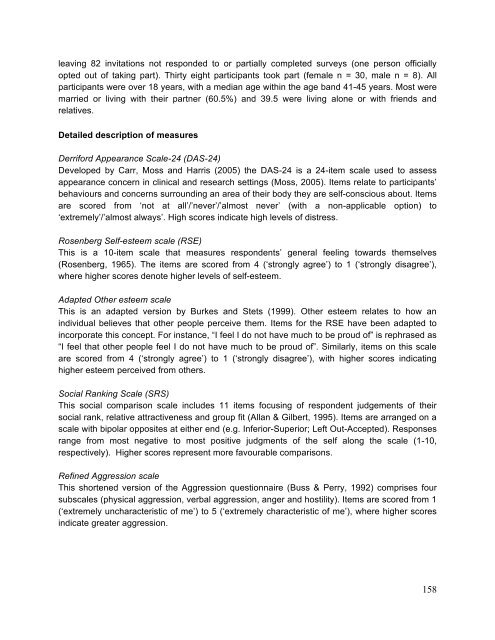Download the report - The Healing Foundation
Download the report - The Healing Foundation
Download the report - The Healing Foundation
You also want an ePaper? Increase the reach of your titles
YUMPU automatically turns print PDFs into web optimized ePapers that Google loves.
leaving 82 invitations not responded to or partially completed surveys (one person officially<br />
opted out of taking part). Thirty eight participants took part (female n = 30, male n = 8). All<br />
participants were over 18 years, with a median age within <strong>the</strong> age band 41-45 years. Most were<br />
married or living with <strong>the</strong>ir partner (60.5%) and 39.5 were living alone or with friends and<br />
relatives.<br />
Detailed description of measures<br />
Derriford Appearance Scale-24 (DAS-24)<br />
Developed by Carr, Moss and Harris (2005) <strong>the</strong> DAS-24 is a 24-item scale used to assess<br />
appearance concern in clinical and research settings (Moss, 2005). Items relate to participants’<br />
behaviours and concerns surrounding an area of <strong>the</strong>ir body <strong>the</strong>y are self-conscious about. Items<br />
are scored from ‘not at all’/’never’/’almost never’ (with a non-applicable option) to<br />
‘extremely’/’almost always’. High scores indicate high levels of distress.<br />
Rosenberg Self-esteem scale (RSE)<br />
This is a 10-item scale that measures respondents’ general feeling towards <strong>the</strong>mselves<br />
(Rosenberg, 1965). <strong>The</strong> items are scored from 4 (‘strongly agree’) to 1 (‘strongly disagree’),<br />
where higher scores denote higher levels of self-esteem.<br />
Adapted O<strong>the</strong>r esteem scale<br />
This is an adapted version by Burkes and Stets (1999). O<strong>the</strong>r esteem relates to how an<br />
individual believes that o<strong>the</strong>r people perceive <strong>the</strong>m. Items for <strong>the</strong> RSE have been adapted to<br />
incorporate this concept. For instance, “I feel I do not have much to be proud of” is rephrased as<br />
“I feel that o<strong>the</strong>r people feel I do not have much to be proud of”. Similarly, items on this scale<br />
are scored from 4 (‘strongly agree’) to 1 (‘strongly disagree’), with higher scores indicating<br />
higher esteem perceived from o<strong>the</strong>rs.<br />
Social Ranking Scale (SRS)<br />
This social comparison scale includes 11 items focusing of respondent judgements of <strong>the</strong>ir<br />
social rank, relative attractiveness and group fit (Allan & Gilbert, 1995). Items are arranged on a<br />
scale with bipolar opposites at ei<strong>the</strong>r end (e.g. Inferior-Superior; Left Out-Accepted). Responses<br />
range from most negative to most positive judgments of <strong>the</strong> self along <strong>the</strong> scale (1-10,<br />
respectively). Higher scores represent more favourable comparisons.<br />
Refined Aggression scale<br />
This shortened version of <strong>the</strong> Aggression questionnaire (Buss & Perry, 1992) comprises four<br />
subscales (physical aggression, verbal aggression, anger and hostility). Items are scored from 1<br />
(‘extremely uncharacteristic of me’) to 5 (‘extremely characteristic of me’), where higher scores<br />
indicate greater aggression.<br />
158


